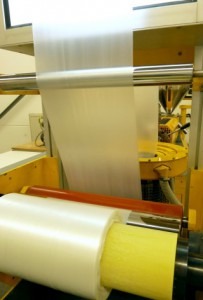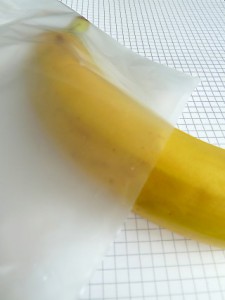Bio-based plastics increasingly replace packaging made of conventional plastics, but they are – in part – competing with the cultivation of foodstuffs. In the ECLIPSE project, Fraunhofer UMSICHT – within an international consortium – has developed a novel packaging concept that does both dispense with fossil raw materials and also does not compete with the foodstuffs industry. The two films developed consist of waste materials as well as algae-based biomass, are compostable, and are assessed for eco-balance.

Algae do, as an alternative biomass source for bio-based plastics, not compete with foodstuffs and are – in part – even incurred as residues from industrial applications. Within the ECLIPSE project, algae from future biomass wastes from the production of biodiesel are utilized for the manufacturing of a bio-based plastic. The novel packaging material primarily consists of polylactic acid (PLA) which is extracted from algae. The properties of the plastic are improved through the utilization of nano scale fibers and fillers from banana peels and almond shells or fish industry waste such as chitin from crustaceans. The bio-based nano plastic composite manufactured this way was processed into two bio-based as well as biodegradable plastic films.
Nano scale makes agricultural film resistant
The material functionalized with nano-scale chitin shells features a high strength of material and is resistant to material damages. Due to its fungicidal properties it may, in the future, also be utilized in the industrial production of biodegradable agricultural films (DIN EN 13432). ”The manufacturing of homogeneous blown film was first performed in the technical shop of Fraunhofer UMSICHT and subsequently as industrial process on a conventional blown film system for films made of polyethylene at the project partner Banacol in Columbia.

Here, it was possible to successfully produce an up to 10 µm thin mono-blown film at a throughput of 100 kg/h,” explained Dipl.-Ing. Hendrik Roch, Bio-based Plastics Department at Fraunhofer UMSICHT. It was possible to process the material even at temperature settings that otherwise are typical for polyethylene films in a stable process. The film showed a high flexibility (breaking elongation at more than 300 percent) and strength, is opaque-transparent and can easily be colored with additives and made UV-resistant this way. In field tests regarding the ripening of bananas, the plastic has already been utilized at two plantations of Banacol with different climates.
Liquid-tight and flexible with inorganic nano fillers
The second application investigated is a compostable film as stand-up pouch packaging for wet wipes. The PLA-based film formulation developed contains functionalized inorganic nano fillers. The transparent material can be processed on a conventional flat film system without a problem and features excellent strength values. To make the packaging flexible and to ensure a low permeability of oxygen and humidity, the extruded flat film was laminated with a barrier film. “The material is still a bit more stiff than, for example, conventionally utilized PET/PE films (polyethylene terephthalate / polyethylene films) for stand-up pouches, but generally the material properties of the biofilm are a match for those of the products based on crude oil any time,” summarizes Roch.
Eco-balance and economic assessment
Concurrent with the technical development of the functionalized bio-based plastic films, Fraunhofer UMSICHT prepared an ecological and economic assessment of the different materials. For the eco-balance, seven environmental impacts, such as the climatic effectiveness of the products, were investigated in addition to the energy expenditure in the manufacturing of the material.
In most of the environmental impact categories and also from an economic point of view, the bio-based product is – at the present state of development – weaker than comparable products made from conventional plastics. A contributing factor in this is also, in particular, the utilization of nano-materials. Commercially produced PLA features in some environmental impact categories advantages in comparison to conventional fossil plastics such as polypropylene. The production of PLA from algae developed in the project requires additional development work and is at the current state of technology not yet competitive.
ECLIPSE – Advanced packaging materials from renewable biogenic resources
ECLIPSE is sponsored by the 7th Research Framework Program of the European Union. The project consortium consists of partners from the following countries: Chile, Columbia, Spain, Germany, Belgium, Sweden and the UK.
Source
Fraunhofer UMSICHT, press release, 2016-09-07.
Supplier
Banacol
Fraunhofer-Institut für Umwelt-, Sicherheits- und Energietechnik (UMSICHT)
Share
Renewable Carbon News – Daily Newsletter
Subscribe to our daily email newsletter – the world's leading newsletter on renewable materials and chemicals









